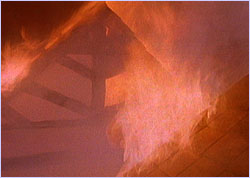
|
 |
 |
Human Response by Marshall Jon Fisher Burns. Hypothermia. Head trauma. Would you know what to do if one of these afflications befell you or to someone you love during an accident? The following emergency procedures, drawn from leading medical guides, will give you the basics. (Note: These descriptions do not pretend to be comprehensive, and many of the effects, such as panic and shock, can occur in any kind of emergency. For more information, see Survival Strategies and the Source list below.) Fire | Car | Plane | Ship  Panic
Panic The smoke alarm has woken you up. You stumble to the top of the stairs and see the reflection of flames in the glass of a picture frame. Your nightmare has come true: Your house is on fire, and your spouse, your baby, and you are trapped on the second floor. Perhaps your worst fear about such a situation is that you'll panic, rendering you unable to take decisive steps to save your family. The best way to prevent panic is to be prepared. Test your smoke alarms regularly. If you don't have a fire escape, make sure you have a rope ladder ready for deployment. Go over in your mind just what you'll do when the blaze begins. Being prepared for the situations below will also keep your mind cool under fire. On Fire One of your greatest fears may be that you or someone close to you will actually be on fire—or at least their clothes may be on fire. This has probably been one of our most primal fears since prehistoric times. Of course, removing yourself or someone else from direct contact with fire is the first step in minimizing the seriousness of burn. If someone or his clothing is on fire, do not let him run—that will only fan the flames with more oxygen. If water is available, douse the flames. If not, roll the person in a blanket or coat on the ground to smother the flames. Then begin treatment for burns. Burns The most obvious threat from fire is burn. Burns are classified into three categories. First-degree burns affect only the epidermis, or outer layer of skin. The skin is usually reddened and possibly swollen, but the outer layer is not burned through. Second-degree burns affect the second layer, the dermis, as well. Blisters, intense reddening of the skin, and severe pain and swelling indicate this. In third-degree burns, all layers of skin, and also possibly fat, nerves, muscles, and bones, may be affected. Areas may be charred black or appear a dry white, and pain is either severe or, if nerves are damaged enough, nonexistent. For first-degree burns or second-degree burns that are limited to an area no more than two to three inches in diameter: Run cool water over the area if the skin is unbroken; after flushing for several minutes, cover with a sterile bandage or clean cloth; and take aspirin, acetaminophen, or ibuprofen to relieve the pain and swelling. For larger second-degree burns, or for third-degree burns, seek emergency assistance immediately. While waiting, make sure the victim is not still in contact with smoldering clothing or other material. Make sure the victim is breathing; if not, use CPR to revive them. Cover the area of the burn with a cool, moist, sterile bandage or a clean cloth. Do not apply ointments. Smoke Inhalation All combustion produces smoke that contains poisons, from carbon monoxide to other poisonous fumes from burning synthetic materials. These can irritate the eyes and result in breathing problems and damaged lungs. Move the victim to a smoke-free area, keeping as low as possible while moving, since the hot smoke rises. Smoke-inhalation victims generally have irritated eyes: Flush the eyes with lots of clean water. If the person is breathing (if not, use CPR), loosen any tight clothing and make him or her as comfortable as possible until emergency aid arrives. If necessary, treat for shock. Depression You've gotten your family out safely, the Fire Department has arrived, the fire is finally under control. You should be euphoric. But your house is badly damaged, if not burned down completely. Inside, valuable papers, photographs, heirlooms, and other possessions have been destroyed. You find yourself depressed, unable to get over the sense of loss. To employ a cliché, count your blessings. No material possession can approach the value of your life and the lives of your family members. By being prepared for fire, you've saved them and yourself. In comparison, what you've lost is trivial. However, such depression is normal, and you should not hesitate to seek counseling if you find yourself unable to get over the loss. —Marshall Jon Fisher is a freelance writer living in Cambridge, Massachusetts. His most recent book is Strangers in the Night: A Brief History of Life on Other Worlds (Counterpoint, 1998), which he wrote with his father David E. Fisher. Sources The Columbia University College of Physicians and Surgeons Complete Home Medical Guide, Third Revised Edition. Crown Publishers: New York, 1995. Fire Protection Handbook, Sixteenth Edition. Cote, Arthur E., Editor-in-Chief. National Fire Protection Association: Quincy, MA, 1986. Langewiesche, William. Sahara Unveiled. Pantheon Books: New York, 1996. Mayo Clinic Family Health Book. David E. Larson, M.D., Editor-in-Chief. William and Morrow and Company: New York, 1990. The Medical Advisor. Time-Life Books: Alexandria, VA, 1996. The Merck Manual of Medical Information, Home Edition. Robert Berkow, M.D., Editor-in-Chief. Merck Research Laboratories: Whitehouse Station, NJ, 1997. Suzuki, Shunryu. Zen Mind, Beginner's Mind. Weatherhill, Inc.: New York, 1970. Escape Through Time | Skydive | Human Response Survivor Stories | Pioneers of Survival | Survival Strategies Resources | Teacher's Guide | Transcripts | Site Map | Escape! Home Editor's Picks | Previous Sites | Join Us/E-mail | TV/Web Schedule About NOVA | Teachers | Site Map | Shop | Jobs | Search | To print PBS Online | NOVA Online | WGBH © | Updated November 2000 |